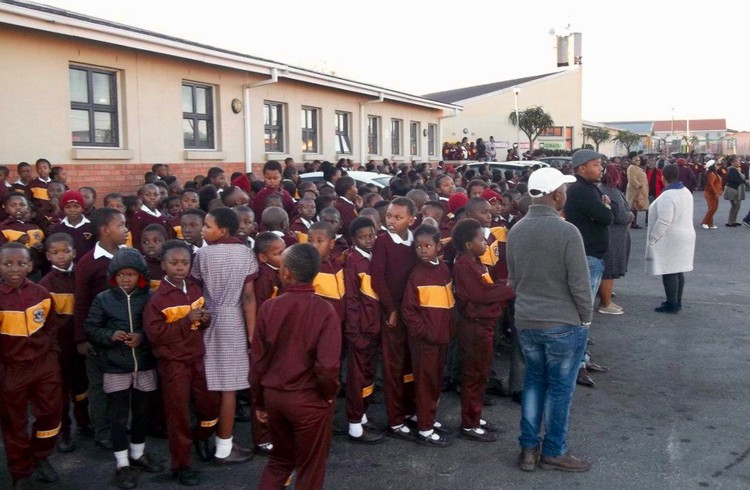Parents lock principal up in primary school
“We want each classroom to have 30 kids like in white schools” says community leader
Protesting community leaders and parents stopped learning and tuition at Wallacedene Primary School on Wednesday.
“We have no control over the situation as the parents have forced kids out of their classrooms,” said Elliot Mampintshi, a security guard.
“We have locked up and detained the principal in a classroom to force the department to send senior officials to listen to us,” said community leader Linda Phito. (The principal was still locked up when GroundUp left the protest on Wednesday.)
The demonstrators sang struggle songs and carried placards that read: “Kids are overcrowded in class”, “We need playground for sport” and “We want a school kitchen”. They also burnt tyres in the street.
“About three years ago, we asked the [education] department nicely to give us temporary classrooms to accommodate surplus learners,” said Phito. “We are now tired of waiting.”
“We want each classroom to have 30 kids like in white schools,” he said. “This is one of the best-performing schools in the province, but the department fails to meet its needs.”
“My daughter [in grade 5] says she sometimes doesn’t hear what her teachers says because her classmates become noisy and disorderly in her jam-packed classroom,” he said.
Chairperson of the School Governing Body (SGB) Sikhangele Mabhulu warned the demonstrating parents: “Don’t burn the school, otherwise you will be forced to sit with them at home as they will have no school.”
Mabhulu said that because of overcrowding at Wallacedene, parents had to send their children to schools further away and pay for transport.
Unathi Ngcwanyo, who has twins in grade 2, said: “In some crowded classrooms kids are forced to sit on the floor for the whole day.”
“We can’t control kids in classrooms with over sixty learners,” a teacher told GroundUp. “We struggle to cope with paperwork. We mark papers until we get exhausted and work on them at home.”
She said learners spent class time standing in long lines waiting for food from the small school kitchen.
Nomga Zwane, who has children in grades 3, 5 and 7, said the kitchen is cramped, dirty and dilapidated. “Cooks bring spoons and pots from their homes.” She also said parents want stones and other objects removed from the playing field so that it can be utilised.
Spokesperson for the Western Cape education department Bronagh Hammond said the department “would like to address these concerns with the SGB and are determining what is possible with the budget and resources available”.
She said: “The District is investigating the possibility of a feeding scheme kitchen.”
“It is sad that the learners are being affected when constructive engagement has been proposed,” said Hammond.
The school was still not operating on Thursday.
Support independent journalism
Donate using Payfast

Don't miss out on the latest news
We respect your privacy, and promise we won't spam you.
Letters
Dear Editor
Being a principal in an under-resourced school is a tough job. Arguably one of the most challenging, yet most crucially important jobs, in today’s South Africa. They have the future of our children in their hands. And every day brings reminders of how little respect they earn for it.
I don't know Ms Mbude, the principal of Wallacedene Primary, nor any specifics about that school, other than what appeared in your article.
What I do know, is that is overcrowding is not specific to Wallacedene. Alas, it is the province-wide result of two trends: a persistent influx of children migrating from the Eastern Cape (adding to the national demographic bulge), and a reduction in real terms education budgets. In the Western Cape, with more children and less money, kids get crammed in a limited number of classrooms, and the department is rarely able to allocate additional teaching posts.
What I also know, is that virtually every principal bears the costs of this appalling reality – the logistics of trying to fit furniture (when you have some!) where the classroom size doesn’t allow, the wear and tear of overused toilets, the burnt-out teachers, who can’t keep kids disciplined – let alone interested – the weaker learners who can’t get individual attention, the disgruntled parents. And principals have to answer to their district officials for the lack of improvement in systemic results, as if we had told them the recipe for miracles.
School principals shouldn’t be held accountable for systemic failure. After all, they are just teachers who were passionate enough about our kids to go the extra mile. Is there nobody to support them when they are locked up, threatened by the gang boss, attacked by disgruntled teachers or parents? If the general public, and the Department of education, accepts that principals become scapegoats, how will we motivate passionate teachers to step up to this crucial job?
As a society, as citizens who care for our children, we must rally behind them. There are programmes for that, like Partners for Possibility www.pfp4sa.org
© 2019 GroundUp.
This article is licensed under a Creative Commons Attribution-NoDerivatives 4.0 International License.
You may republish this article, so long as you credit the authors and GroundUp, and do not change the text. Please include a link back to the original article.

